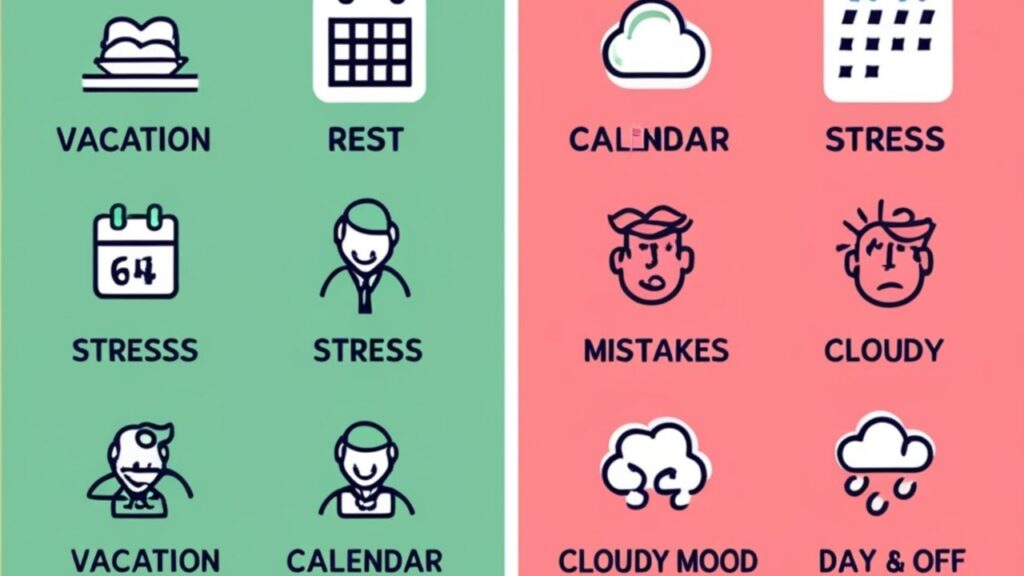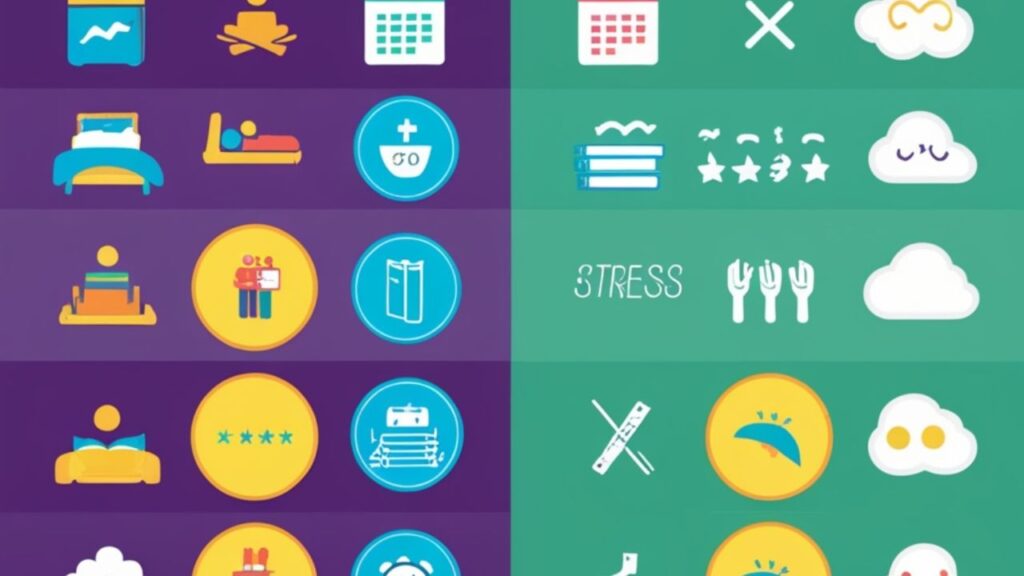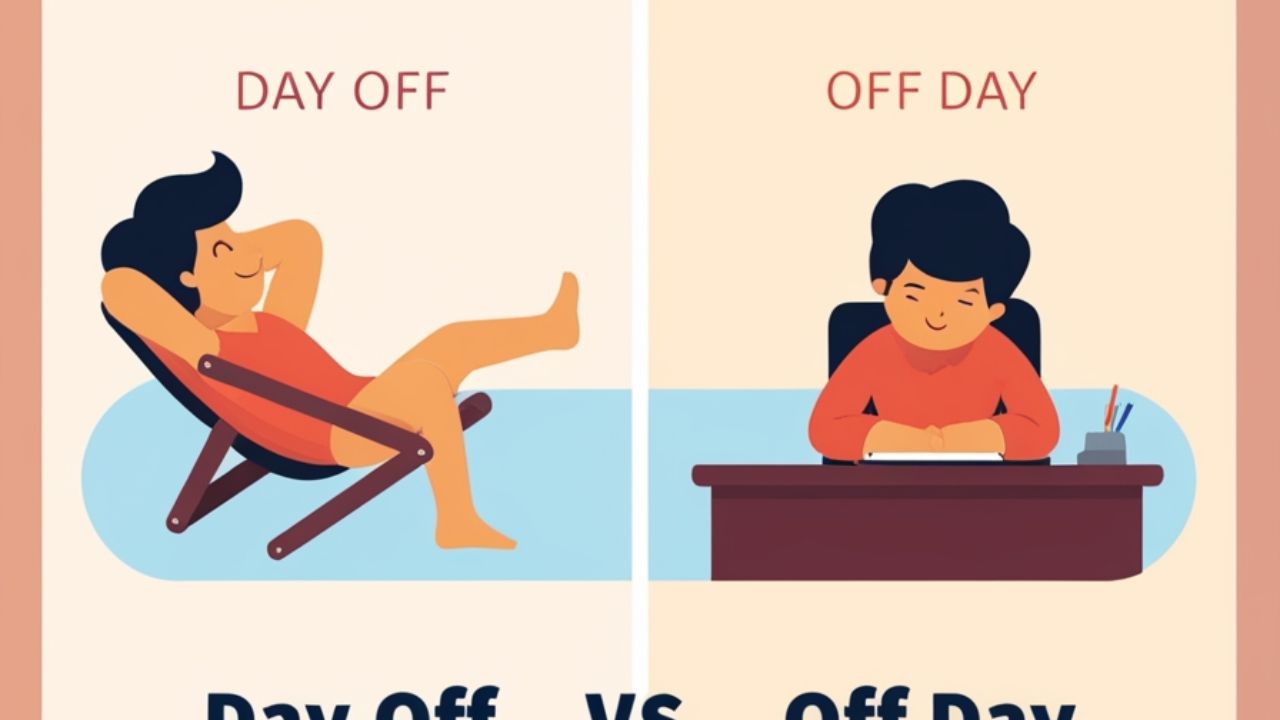A day off means you don’t go to work or school because you’re resting or relaxing. People plan it ahead of time. It’s a happy time for doing fun things like watching movies or playing with friends.
An off day means you don’t feel your best. You might make small mistakes or feel tired. It can happen to anyone, even when they try their best. On such days, it’s okay to take things slowly.
Both words sound similar but mean different things. A day off brings peace and joy, while an off day feels hard. Learning this small difference helps you use them correctly when you talk or write.
Why “Day Off” and “Off Day” Confuse So Many People
Many learners mix up day off and off day because the words sound almost the same. The small change in word order makes a big change in meaning. It’s easy to get mixed up when both phrases talk about work and rest.
A day off means planned rest, while an off day means something feels wrong. People often use them wrongly when talking about being away from work. Learning how each phrase works helps everyone speak and write more clearly.
- Same Words, Different Order: Both phrases use the same two words, but switching their order changes the meaning completely. This small change makes learners think they mean the same thing.
- Similar Sound: The phrases sound alike when spoken quickly. Because of this, people often mix them up during daily conversations or while writing.
- Both Involve Rest or Work: Each phrase talks about being away from regular work, but for different reasons—day off means planned rest, while off day means feeling low or not performing well.
Definitions and Core Differences: At a Glance
| Phrase | Definition | Emotional Tone | Common Contexts | Example Sentence |
| Day off | A planned or scheduled break from work or duties | Positive / Neutral | Work, school, healthcare | “I’m taking a day off tomorrow.” |
| Off day | A day when someone performs poorly or feels “off” emotionally or mentally | Negative / Frustrated | Sports, work, mental health | “I’m having an off day at work.” |
What Does “Day Off” Really Mean?

Examples of “Day Off” Usage:
- “I’m taking a day off tomorrow to visit my grandparents.” – This shows planned time away from work or school for personal reasons.
- “She gets two days off every week.” – This means regular rest days in her schedule.
- “Today is my day off, so I’ll stay home and relax.” – This shows a calm, planned break from daily duties.
Tone & Implication
- Positive Feeling: A day off carries a happy or calm tone because it means planned rest and relaxation.
- Sense of Relief: It often shows freedom from duties, giving time to recharge or spend with loved ones.
- No Negativity: It doesn’t suggest problems or sadness; it simply means taking a peaceful break.
Grammatical Use
- Countable Noun: You can say a day off or two days off to show the number of rest days.
- Common Verbs: It usually follows verbs like take, have, get, or request.
- Placement in Sentences: It often comes after the verb, for example, I’m taking a day off tomorrow.
When and How to Use “Day Off” in Sentence
| Structure Type | Example Sentence |
| Requesting | “Can I take a day off next Friday?” |
| Describing | “I’m on my day off today.” |
| Scheduling | “She has a day off every second Monday.” |
| Using in HR emails | “Employees are entitled to 15 paid days off per year.” |
Synonyms for “Day Off”
- Vacation Day: Used when someone takes time off for travel or personal enjoyment.
- Personal Leave: A formal term for taking time away from work for private matters.
- Rest Day: Describes a simple break from duties to relax and regain energy.
What Does “Off Day” Mean?
- Feeling Low: An off day means a person doesn’t feel good or can’t focus properly. It’s when things just don’t go right.
- Poor Performance: It’s used when someone makes mistakes or doesn’t do their best at work, school, or sports.
- Temporary Mood: It describes a short period of low energy or sadness that usually passes after some rest or relaxation.
Examples of “Off Day” Usage:
- “I’m having an off day and can’t focus on my homework.” – This shows a time when someone isn’t feeling sharp.
- “The player had an off day and missed many shots.” – It means the person didn’t perform well.
- “It’s just an off day; tomorrow will be better.” – This shows a short period of low energy or mood.
When and How to Use “Off Day” in Sentences
| Structure Type | Example Sentence |
| Performance-based | “The pitcher had an off day and gave up five runs.” |
| Mental/emotional | “I’m not myself today – just an off day, I guess.” |
| Casual usage | “Ugh, it’s been an off day from the start.” |
Synonyms for “Off Day”
- Bad Day: Describes a time when nothing seems to go right.
- Rough Day: Means facing small troubles or mistakes throughout the day.
- Low Day: Shows a feeling of sadness or tiredness that affects one’s mood or work.
See also Excel vs Accel: Meaning, Usage, and Examples
Key Contextual Differences Between “Day Off” and “Off Day”
| Feature | Day Off | Off Day |
| Planned or Unplanned | Planned | Unplanned |
| Emotional Tone | Positive / Relaxed | Negative / Frustrated |
| Used In | HR, calendars, time-off requests | Sports, work stress, emotional health |
| Reason | Rest, holiday, leave | Fatigue, stress, poor performance |
| Is it a break from work? | Yes | Not necessarily |
Venn Diagram Summary:
- Day Off: Planned rest, positive mood, used for breaks or holidays.
- Off Day: Unplanned, negative feeling, shows tiredness or poor performance.
- Middle Area: Both describe a change from normal routine and focus on how a person feels or performs during that time.
Common Mistakes People Make

- Using Off Day for Vacation: Many say off day when they mean day off, which makes the sentence sound confusing.
- Mixing Meanings: Some think both phrases mean rest, but one shows tiredness while the other shows planned relaxation.
- Wrong Use in Work Emails: People often write off day in formal requests, though day off is the correct and polite choice.
Real-Life Examples: “Day Off” in Context
Workplace Email:
Subject: Request for Day Off “Hi Karen, I’d like to request a day off on Tuesday, June 12th to handle a personal matter.”
Social Media:
“Finally got a day off after three weeks straight. Time for Netflix and snacks.”
News Example:
“Employees are expected to receive additional paid days off under the new policy.”
Real-Life Examples: “Off Day” in Context
Sports Coverage:
“LeBron had an off day, missing 8 out of 10 free throws.”
Mental Health Blog:
“Having an off day doesn’t mean you’re broken – it just means you’re human.”
Casual Conversation:
“I can’t focus on anything today. Total off day.”
Alternative Phrases for “Day Off”
| Term | Best Used When… |
| Paid Leave | Formal, HR documents |
| Vacation Day | Long-term absence, traveling |
| Mental Health Day | Needing rest for emotional wellbeing |
| Personal Time | Broad, professional tone |
| Break | Informal conversations |
Substitutes for “Off Day”
| Alternative Phrase | Tone | Use Case |
| “Off my game” | Casual | Sports, work |
| “Not myself” | Neutral | Emotional, mental fatigue |
| “Having a rough one” | Informal | General bad day |
| “Everything’s off” | Broad | Chaos or dysfunction |
Native Speaker Insights
- Everyday Usage: Native speakers use day off for planned breaks like weekends or holidays, while off day describes times they don’t feel their best.
- Formality Difference: Day off sounds more formal and fits in workplaces; off day is casual and used in speech.
- Cultural Context: In some cultures, day off may include religious or family rest days, while off day always relates to mood or performance.
See also Leafs vs Leaves Explained: Plural Rules in English
Final Thoughts
(A visual comparison is ideal here – consider uploading a downloadable version for readers.)
How to Politely Ask for a Day Off at Work
Sample Email Template:
Writing an email to ask for a day off should be short and polite. Begin with a friendly greeting, share the reason clearly, and add the date. Use kind words to show respect and keep your message simple and easy to read.
Here’s a helpful example: “Dear Sir, I hope you are fine. I want to take a day off on Friday to attend a family event. Please let me know if it’s okay. Thank you for your understanding and support.”
FAQs
Which one is correct, off day or day off?
Both are correct, but “day off” means a break from work, while “off day” means an unproductive or unlucky day.
Is day off one word or two?
It’s two words—“day off.” The one-word form “dayoff” is incorrect.
What is meant by “off day”?
It means a bad or unproductive day when things don’t go as planned.
Is it day off or days off?
The correct plural form is “days off,” meaning multiple days of rest or leave.

Join Bibcia on a journey to master English grammar. Discover easy lessons, writing tips, and practical examples designed to make learning grammar simple and effective.










